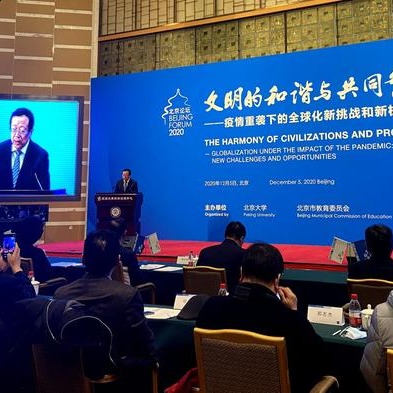


Forum calls for harmony of civilizations amid pandemic, worldwide challenges
Countries and regions must stand together and forge extraordinary synergy to fight off the COVID-19 pandemic and other common challenges facing humanity, guided by the philosophy of building a community with a shared future for mankind, international scholars and experts said at the Beijing Forum.
The forum, an annual event initiated in 2004, was held at Peking University on Saturday. It was organized by the university, the Beijing Municipal Education Commission and the Chey Institute for Advanced Studies.
Under the theme "The Harmony of Civilizations and Prosperity for All-Globalization under the Impact of the Pandemic: New Challenges and Opportunities", this year's forum aims to map out a better future characterized by the harmony of civilizations and prosperity for all by exploring ways for nations to cooperate, achieve win-win progress and promote mutual learning about cultures from multiple perspectives and in various fields.
In a recorded video sent to the forum, United Nations Secretary-General Antonio Guterres called for the world to learn from the public health crisis and stressed the importance of international cooperation.
"We are advocating a massive rescue package for the world's most vulnerable people and countries, and for a people's vaccine available to everyone, everywhere. The decisions we make in the coming months will shape the lives of generations to come. International cooperation will be essential," he said.
Hao Ping, president of Peking University, said as important bridges for people-to-people exchanges and academic cooperation, universities around the world should build an international academic community with a shared future.
"From a long-term perspective, the impact of the pandemic on universities is not only 'transient', but it will also reshape the mission, responsibilities, pattern and model of higher education," Hao said.
During the pandemic, the use of new technologies has greatly expanded the borders of higher education, and future universities will become more open and inclusive, he said.
Stephen Toope, vice-chancellor of the University of Cambridge, stressed that academic institutions should find ways to continue to work together as no institution or country, no matter how seemingly isolated, is immune to events occurring somewhere else on the planet.
"The greatest issues we face are global. There is nothing like a global pandemic to reveal just how intricately and profoundly connected we are, even in this politically fraught world," he said.
In tackling some of the big issues-from COVID-19 to the climate crisis-people need the diversity of backgrounds, of views and of expertise that can only come from equitable, open partnerships, he said.
Fukuda Yasuo, former prime minister of Japan, said it is undeniable that economic globalization has improved the overall level of the global economy and provided developing countries with more opportunities.
Without economic globalization, there would be no wealth and prosperity in the world today, he said, adding that economic globalization will also be accompanied by "pains", which are part and parcel of the modernization process.
Klaus Schwab, founder of the World Economic Forum, said: "The pandemic has again shown us that we are interdependent. Even if we have conflicts, even if we are sometimes competitors, but at the end, it's our global togetherness."
"We have to believe in the principle of human beings being virtuous, being benevolent, because only if we rely on this positive nature of humankind, we can mobilize all the energy which we need to construct a positive future."
Wu Zunyou, chief epidemiologist of the Chinese Center for Disease Control and Prevention, said winter has just begun, and the epidemic will become more complicated.
"Although China has successfully contained the virus, to be honest, we cannot have a turnaround until the global pandemic is under control," he said.
From the perspective of epidemic prevention and control strategies, public health measures such as wearing masks, maintaining social distancing, washing hands frequently and frequent ventilation are very effective, but they can only achieve effective results with the coordinated actions of all countries, he said.
Especially in the last few months, everyone is paying a lot of attention to the new vaccines for COVID-19, he said, adding he hopes the new vaccines can control the pandemic and allow people around the world to return to normal life and work as soon as possible.
If you have any problems with this article, please contact us at app@chinadaily.com.cn and we'll immediately get back to you.